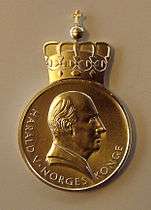Medal for Heroic Deeds
| Medal for Heroic Deeds Medaljen for edel dåd | |
|---|---|
|
Obverse and reverse of the medal in gold | |
|
Awarded by | |
| Type | Two grade medal (Gold and Silver) |
| Statistics | |
| Established | 19 August 1885 |
| Precedence | |
| Next (higher) |
St. Olav's Medal With Oak Branch (Gold) King Haakon VII's Medal of Liberty (Silver) |
| Next (lower) |
King's Medal of Merit (Gold) Medal for Rescue at Sea (Silver) |
|
Ribbon bar of the medal | |
The Medal for Heroic Deeds was instituted by royal resolution on 19 August 1885 and is awarded for honorable actions in saving lives or a comparable act. There was originally three classes, but from 1905 the medal has been awarded in gold and silver.[1] To be awarded in gold the recipient must have committed an unusually notable rescue of life where the rescuer's life was put at risk. The medal is surmountet by the Crown of Norway and the adverse side features the portrait, name and title of the reigning monarch. At present the portrait is of King Harald V of Norway and the inscription reads «Harald den 5, Norges Konge» (Harald the fifth, King of Norway). The reverse features an oak reaf and the words «For edel dåd» (For noble deed). The ribbon is in the national colours of Norway: red, white and blue.
See also
References
- ↑ Medaljen for edel dåd Store norske leksikon. Retrieved 22 October 2013 (Norwegian)

